It’s difficult to even know where to begin to talk about THE OUTPOST or to fully express the emotional intensity and power of this film, but to say upfront: This is the Best Picture of the Year.
THE OUTPOST is an emotional powerhouse that grabs your heart and soul with both hands and doesn’t let go. This is not an action movie. This is a “war movie”. This is about the men who are in the heat of battle. This is about the men who are on edge and battle-ready 24/7, never knowing when the Taliban will attack, a bomb will fall, a man will die. We connect with each and every man. We get to know them. We care about them. We laugh with them at their frat boy humor. We ache for each of them as bullets ring out. We cry with them at a fallen brother. It is this personal connection that propels THE OUTPOST into an even higher level of excellence. Caleb Landry Jones is a frontrunner for Oscar consideration. And dare I say that director Rod Lurie is definitely award-worthy as well, as are the artisans who helped craft this masterful film. This is how you make a film.

Adapted by Paul Tamasy and Eric Johnson from the New York Times best-selling non-fiction book by Jake Tapper, “The Outpost: An Untold Story of American Valor”, this is the story of the men of Bravo Troop 3-61 CAV and the Battle of Kamdesh. The adaptation is rock solid with grit and truth that leaps from the screen. Nothing is sugar-coated. Nothing is romanticized.
Located in a valley deep in the Afghanistan mountains is Combat Outpost Keating where Bravo Troop is stationed. A complement of 54 men totally exposed to attack from the mountains surrounding the outpost, every soldier there was on tenterhooks, waiting and wondering when the “big one” would happen. Already receiving sniper fire on a daily basis, each man knew it was only a matter of time before the engagement intensified and increased. And it did. On October 3, 2009, Outpost Keating was attacked by the Taliban. With no air support, cut-off from any immediate assistance from other units, it fell to these 54 men to hold the line relying only on each other. The attack never should have happened. One of the basic rules of battle is to never concede the high ground yet, in one of the most ill-conceived military decisions ever, Combat Outpost Keating was put at the base of three mountains. Once that was done, Bravo Troop had only one clear objective, one mission – to survive. At the end of the day, the Battle of Kamdesh would forever be remembered as the bloodiest American engagement of the Afghan War and the men of Combat Outpost Keating would become one of the most decorated units of the 19-year conflict.

There have been several superb war movies over the years, Hacksaw Ridge, We Were Soldiers, Heartbreak Ridge, The Longest Day, Dunkirk, just to name a few, but the element that sets THE OUTPOST apart is the expected yet unseen aspect of war. In the very construct of these other films, in the lensing, we saw what was coming, knew what was coming. With THE OUTPOST, like the soldiers at Outpost Keating, we don’t see what’s coming, and much of that is due to Erik Carlson’s production design in recreating and building Outpost Keating. Buildings are fortified. There are minimal to no windows. There is no line of sight or peripheral vision around any corner to see what’s coming or who’s standing there. For anyone who has seen the documentary Restrepo from Tim Hetherington and Sebastian Junger which they shot in Afghanistan at Camp Restrepo in the Kandahar Valley, you will immediately see the authenticity and detail that Carlson brings to play with THE OUTPOST. Adding to the authentic look and layout is that Carlson was able to work from the actual plans, diagrams, and photographs for Outpost Keating thanks to the involvement of Ty Carter and other men who were stationed there and embroiled in the Battle of Kamdesh.

And just who are these soldiers? The casting is perfection. Talk about an ensemble! And this is truly an ensemble. There is an earnestness and ferocity and resonance that each actor brings to the table which reaches through the screen and connects with each of us. Each man is as believable as the next. You never doubt for a moment that these are soldiers. You forget they are actors. There is nothing “Hollywood” about the performances, the dialogue, the script as a whole. And every time action intensifies, one can’t help but thank God we have soldiers like this defending us. But the real standout is Caleb Landry Jones. He is truly standing head and shoulders above the crowd as Specialist Ty Carter. Landry Jones takes us on an emotional roller coaster ride that should garner him plenty of awards and possibly even that little golden Oscar. Right behind him is Scott Eastwood as Staff Sergeant Clint Romesha. (Both Carter and Romesha went on to be awarded the Medal of Honor.) Eastwood is a powerhouse and yes, not only does he look and sound like his father, but there are certain moments and certain lines of dialogue where you do a double take, thinking Clint himself is standing there.
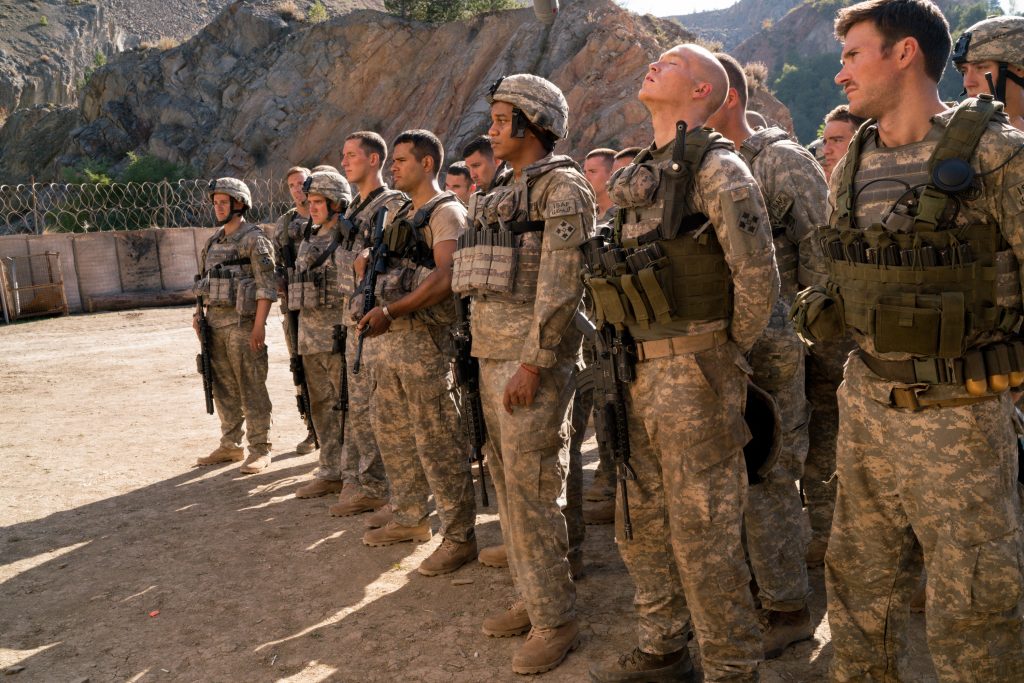
Eastwood isn’t the only next generation to enlist in THE OUTPOST. As Captain Robert Yllescas, seeing Milo Gibson in uniform and at certain angles is at times like looking at his father in We Were Soldiers, which only serves to deepen the connection to Yllescas. Gibson is a force to be reckoned with and commands the screen. James Jagger (son of Mick) is soldier Chris Jones while Scott Alda Coffey (Alan Alda’s grandson) is soldier Michael Scusa. Also on hand is Will Attenborough (Sir Richard’s grandson) as Pvt. 1 Edward Faulkner. But don’t be fooled. Each of these men brings it with every movement, every look, every word. They are fine legacies to their more noteworthy relatives.
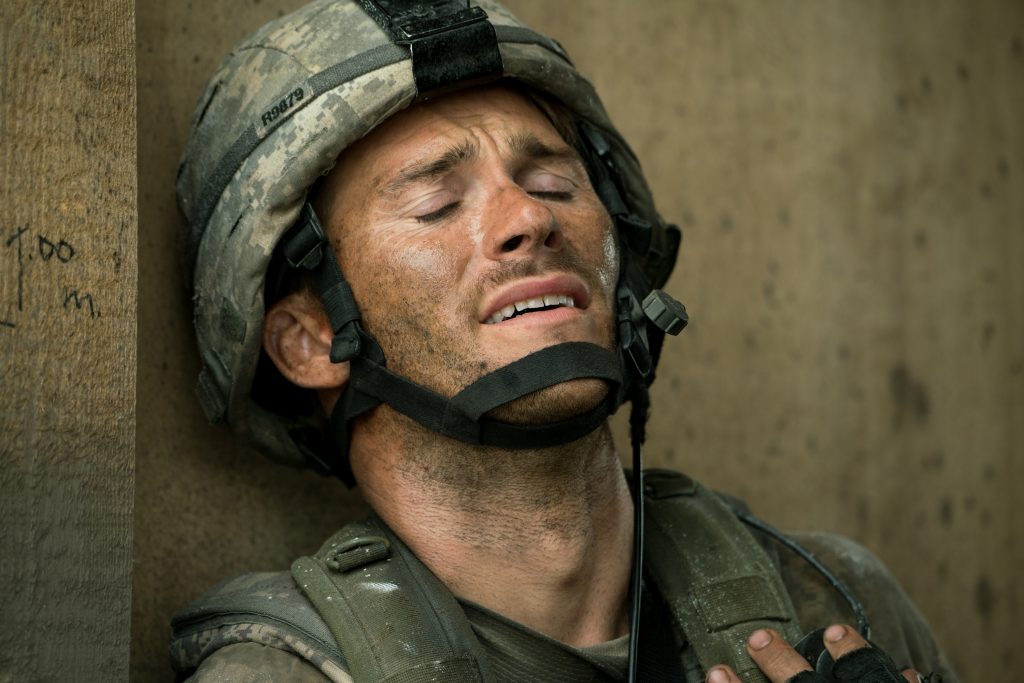
Orlando Bloom is dynamic as First Lt. Benjamin Keating and puts forth a strength of character befitting a man in this command. Cory Hardrict brings a wonderful ease and affability to Sergeant Vernon Martin while Kwame Patterson makes us not only understand why the men refer to his character of Sylvanius Broward as “Broward the Coward”, but lets us see why Broward is the way he is. Be on the lookout for a dynamite scene between Eastwood and Patterson that will have you cheering. Chris Born as Stefan Mace is particularly noteworthy and truly comes into his own in the third act in engagement with Landry Jones’ Carter. Jacob Scipio is outstanding as Staff Sergeant Justin T. Gallegos while Taylor John Smith knocks it out of the park as First Lt Andrew Bundermann giving Bundermann both an uncertainty of command while still being decisive in the moment.
Adding even more authenticity and gravitas is the additional casting of Bronze Star recipient Daniel Rodriguez who plays himself in the film. Rodriguez was in the Battle of Kamdesh. Henry Hughes and other military veterans also appear, adding just one more layer of authenticity to the film.
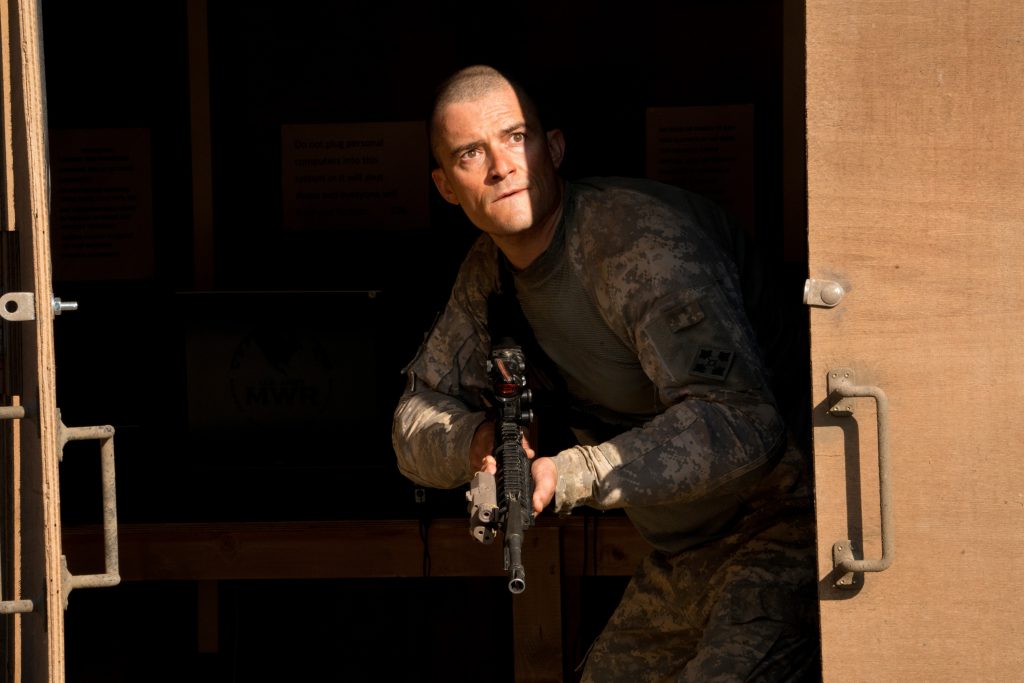
Constructing the film with “chapterization” helps not only with the minimal timeline for time reference, but personalizes this story as we meet each man in their role as a soldier. While the focus of each “chapter” may be to introduce us to one man, we are then treated to his interaction with his brothers in arms. We get to know them just through casual banter. Who would have imagined Carter’s background and all the grunt jobs he had before entering the military; or that a soldier fondling a photo of Sophie and talking about getting home and holding her and hugging her would not be what one might expect. We see a close-up of a cheese omelet being prepared for one soldier while another eats an MRE, reminding us this is war and we are in enemy territory. We see the men try for some sort of normalcy of life while under the constant specter of attack and death. And we connect with each of them, even the very unliked Broward the Coward.

The suddenness with which attacks occur is shocking not only to these soldiers but to us watching. We are in the firefights. We are shaken to the core with each bullet, each RPG, each pounding foot on the ground, each bead of sweat, each drop of blood. This is where Lurie’s experience as former military and a West Point graduate along with his technical prowess as a director excels. Complementing Lurie is the superlative work of cinematographer Lorenzo Senatore, editor Michael Duthie, supervising sound editor Kris Casavant and sound designer Ryan Nowak, making THE OUTPOST a fully sensory and emotionally tangible and immersive film. We are there.
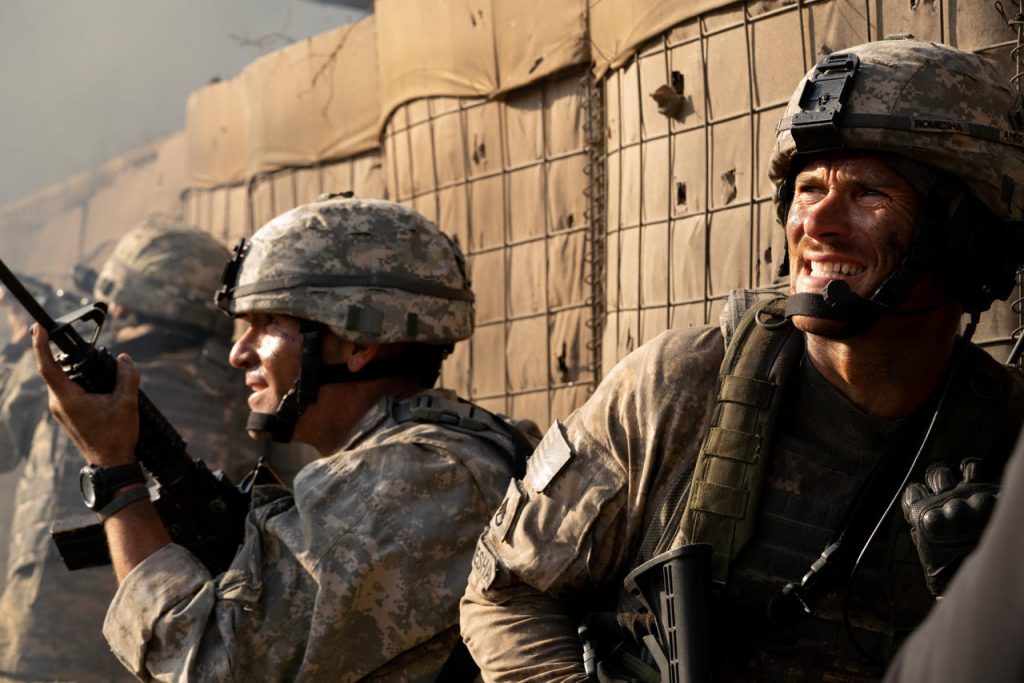
The attention to the sound design and mix is award-worthy, starting with the echo of voices in the canyon when the men leave the barracks in the morning to patrol the valley and the surrounding mountains. Throughout the film, the specificity of ammunition, and its layering with each attack, and ultimately the third act attack starting at approximately the 1hr 7min mark, is chilling. The sound design and mix is extremely sensory to the point of almost “feeling” the bullets striking. And then the sound team layers in dialogue, wind, helos (and the differing engine and blade sounds between Apaches, medivacs, etc.), pounding footsteps, the lock and load of the machine gun tripod, the clang of bullets hitting a humvee, the single gunshot killing a dog, the sound of peeing or the exhale of cigarette smoke or crackle of a night “campfire.” So meticulous that we can even hear the sound of flies buzzing during a meeting with the local tribal elders. When in combat, soldiers senses are heightened and that includes sound. Thanks to Casavant and Nowak and their team, the audience gets to experience that same heightened sensory perception.
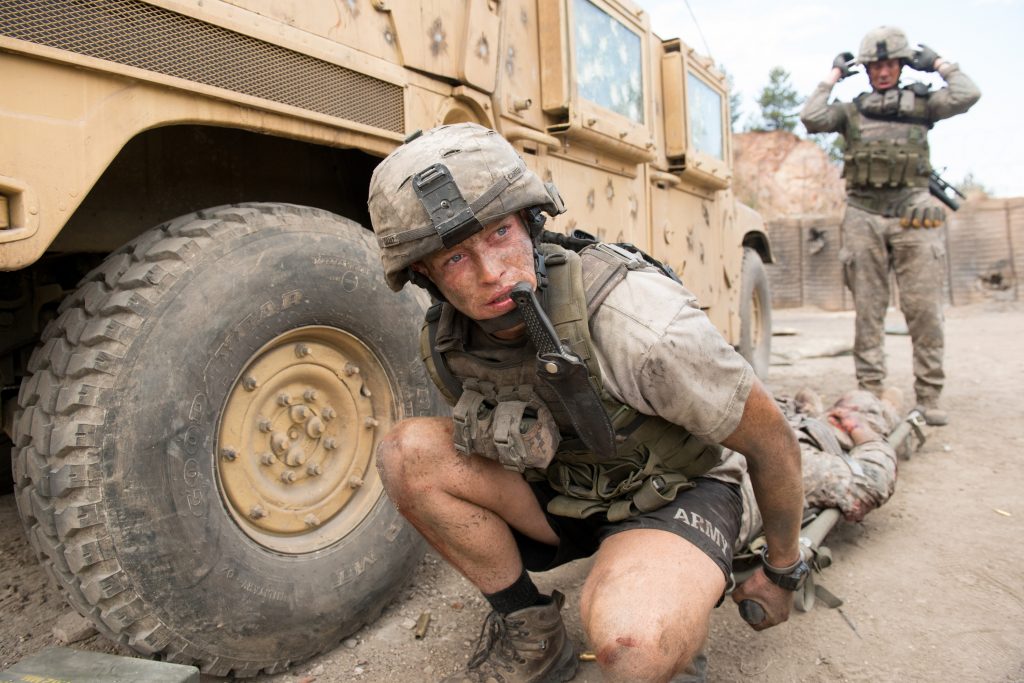
After seeing what cinematographer Lorenzo Senatore delivered with Meagan Leavey, his lensing of THE OUTPOST is not surprising. Award-worthy. Talk about riveting and nail-biting! Handheld camera work is beyond exemplary. This film could not have been made and have the heart-pounding impact it has without that. The constant movement, but for quiet moments from which we are then shaken to the core and action ensues, puts us in the whirlwind almost surreal headspace that a soldier in combat feels. We feel the “think on your feet” aspect of being under fire and under pressure. The camera captures the frenzy; the harrowing nature of the situation. And then that is punctuated with ECUs. Lurie and Senatore put us right there in the action, in the moment. We feel the life draining from the wounded, from their faces. Long extended shots, oners, put us in the shoes of the soldiers, never more important than when October 3 comes around and the Taliban attacks by the hundreds from the mountains. We have the same view as each soldier. And adding more power to the punch, there are moments in the second half of the film when the camera is actually in the face of a soldier with the camera operator running backwards, maintaining the fear, the determination on a man’s face at eye level with us. Lurie goes for the jugular and succeeds every time. But what we also see is the beauty of that land, those mountains. A river with the rocks and rushing water moving over the rocks with sunlight dancing on it and trees wafting ever so slightly in a late morning breeze is pastoral, almost spiritual. We forget this is a war zone. We are lulled into a false sense of security and then just as quickly shocked back into reality with an explosion and a body in the water. So many cinematographers often fail to capture the texture within “sand” and “rock”, but Senatore’s lens gives us texture with the landscape and then even more texture as we go into the barracks and see the homey touches, the golden tones, the color saturation, and surprisingly, while close-quartered, there is not a feeling of claustrophobia but rather the warmth of camaraderie and brotherhood. A beautiful study in contrasts.
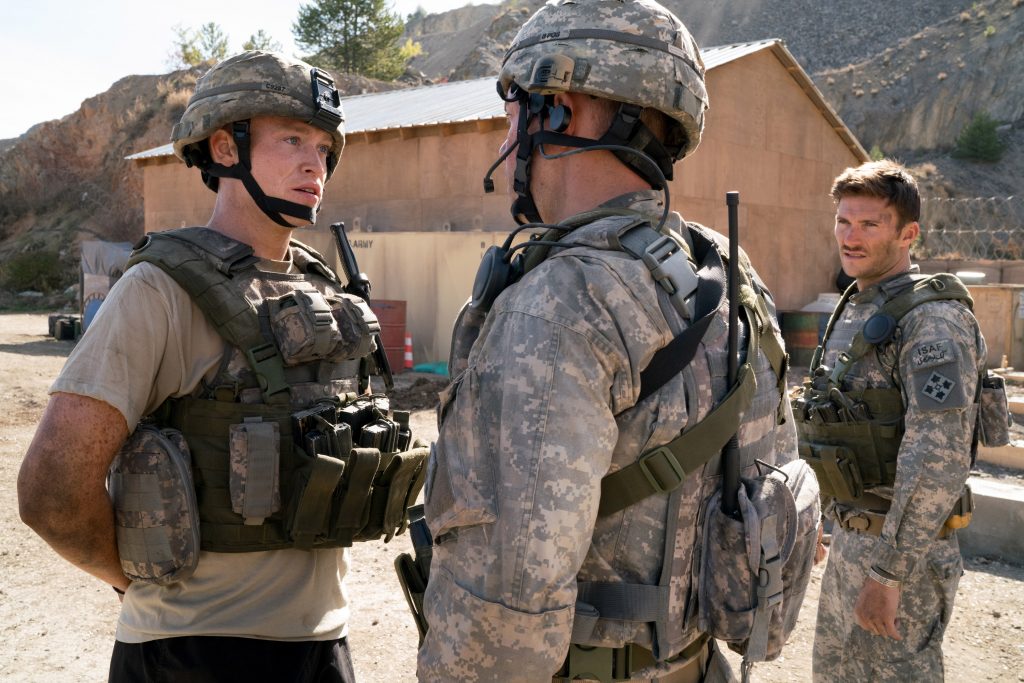
But then we must turn to Michael Duthie’s editing. Rapier. In your face. Once the film hits the halfway point, forget about breathing. The speed of the battle is relentless. Beyond bullets, RPGs, machine guns, this is an assault on the senses and on the heart. Rapid fire cuts have a lyricism which almost mirrors the action; long oners that capture the movement of Carter as he runs and swerves, Romesha as he hustles and moves almost like a cheetah to get to the front gate. But then we have the moments. The earlier moments where boys are being boys and we can breathe. A delicate balance.
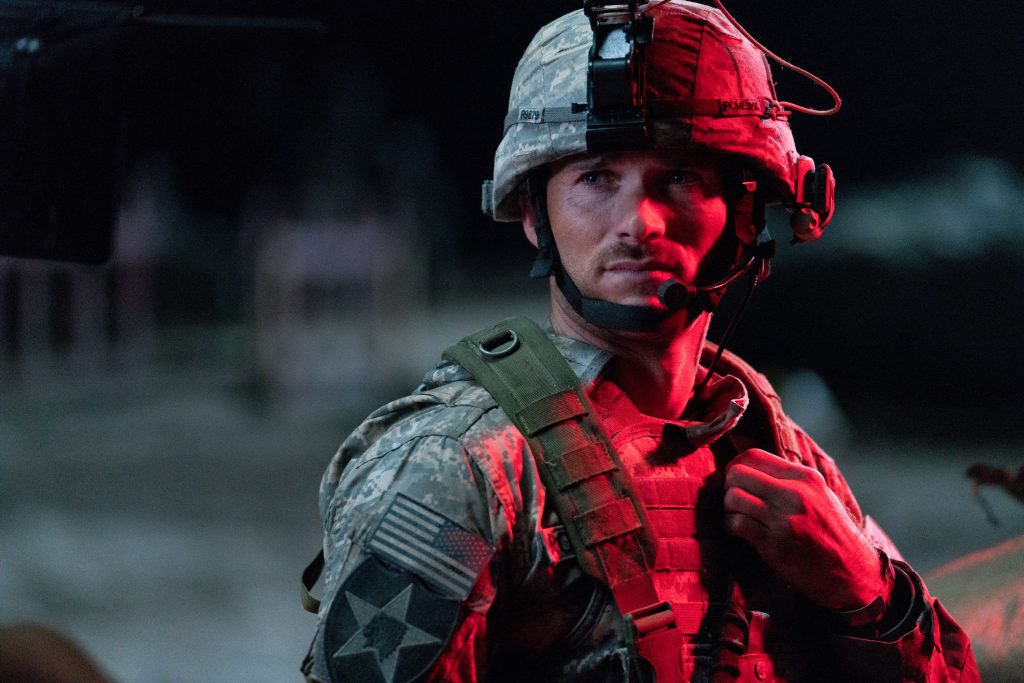
Rounding out the experience is Larry Groupe’s score. It wouldn’t be a Rod Lurie film without him. Known for being a “master at the oscillation between major and minor keys”, that talent is on display in THE OUTPOST. Never overpowering, and almost completely absent during the battle, the composition is subtle in its construct and in its use within the film. Not to be missed is the end credit song, the lyrics written by Rod Lurie himself.
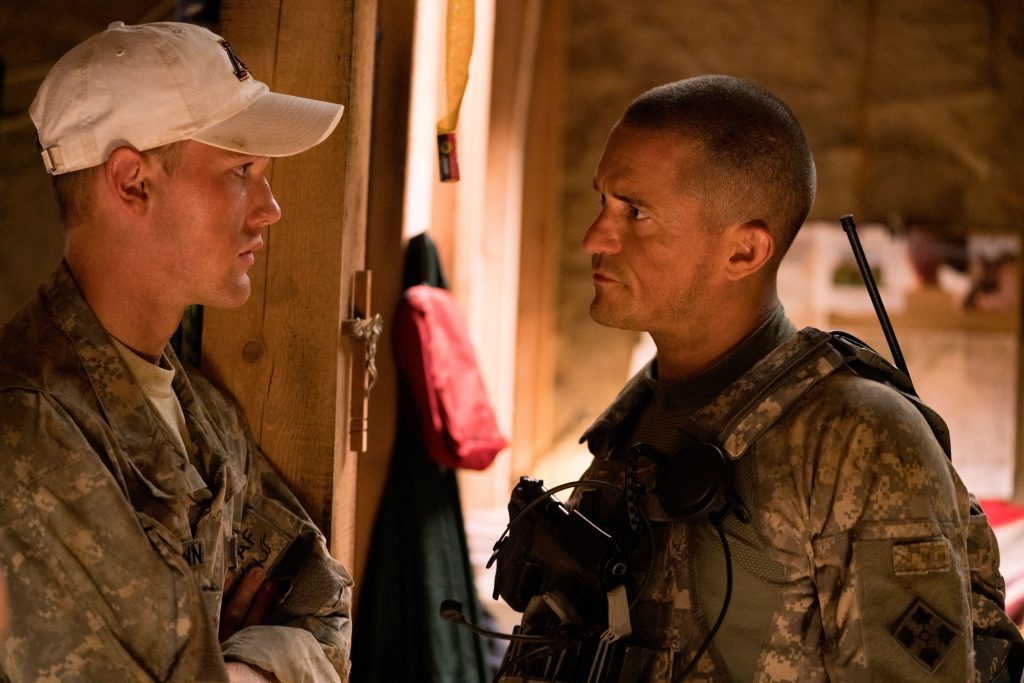
Award-worthy at every turn, THE OUTPOST has forever imprinted on me. It is indelible and unforgettable. It is not for the feint of heart. There is a wonderful line in the film – “God’s plan is our chaos.” The chaos and tragedy of Kamdesh is that this battle never had to happen. This camp never had to be in that place; shouldn’t have been in that place. But from that chaos came the valor, bravery, and brotherhood of the men of Combat Outpost Keating.
Directed by Rod Lurie
Written by Paul Tamasy and Eric Johnson based on Jake Tapper’s best-selling non-fiction book The Outpost: An Untold Story of American Valor
Cast: Scott Eastwood, Caleb Landry Jones, Orlando Bloom, Milo Gibson, Cory Hardrict, Jack Kesy, Kwame Patterson, Jacob Scipio, Taylor John Smith, James Jagger, Jonathan Yunger, Will Attenborough, Scott Alda Coffey
by debbie elias, 06/23/2020











